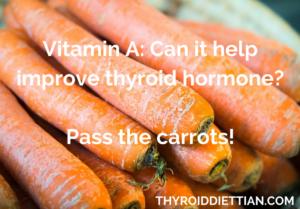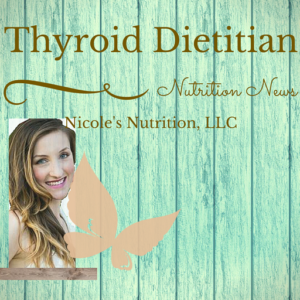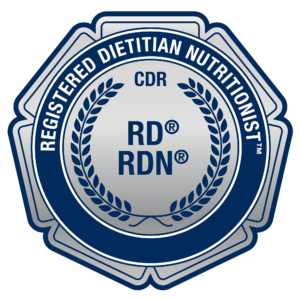 These series of posts are not a substitute for medical advice. For advice and recommendations on supplementation, ask your Doctor or local Registered Dietitian.
These series of posts are not a substitute for medical advice. For advice and recommendations on supplementation, ask your Doctor or local Registered Dietitian.
I am a big proponent of optimizing nutrients in order to improve thyroid health. There are many small things that affect the critical conversion of T4 to T3, and nutrients can be one of them. In this series of posts, we will dig deeper into each vitamin and mineral and how it may play a part in thyroid function!
Vitamin A
The vitamin known for keeping our vision and eyes healthy. I like to call vitamin A the “vegetable vitamin” since it is present in significant amounts in most all veggies and many fruits as well. I won’t dive deep into the nitty gritty of vitamin A types and functions since that could take all week.
As it relates to thyroid health…
- The thyroid helps convert vitamin A to a more usable form in the body. If you are hypothyroid, this proecss will not function as well.
- A 2012 study showed a link between supplemental vitamin A ro reducing TSH and improvement of other thyroid hormones.
- Extremely low protein diets may also contribute to vitamin A deficiency (which could then possibly reduce thyroid function). This is why I see many who lack nutrients and protein/calories have issues with high TSH and low T3, T4.
- Vitamin A very generally reduces inflammation in the body, but specifically, in the whole food plant form.
- Other factors that reduce vitamin A absorption or coversion: digestive issues, toxins, alcohol, excess vitamin D supplementation
A Note on Supplementation
I never recommend a vitamin A supplement since it is fat soluble and can easily build up in the body and become toxic. It is extremely easy to get loads of vitamin A from food. For example, eating just one medium carrot (not one baby carrot, but a regular size) provides 204% daily value for your day! This is much safer and healthy as well!
Foods High in Vitamin A
- carrots
- sweet potato
- kale (cook to reduce goitrogens)
- spinach
- broccoli (cook to reduce goitrogens)
- other leafy greens (mustard, collards, turnip greens, beet greens, swiss chard)
- winter squash
- romaine lettuce (yes! there is nutritional value)
- cantaloupe
- bell peppers






